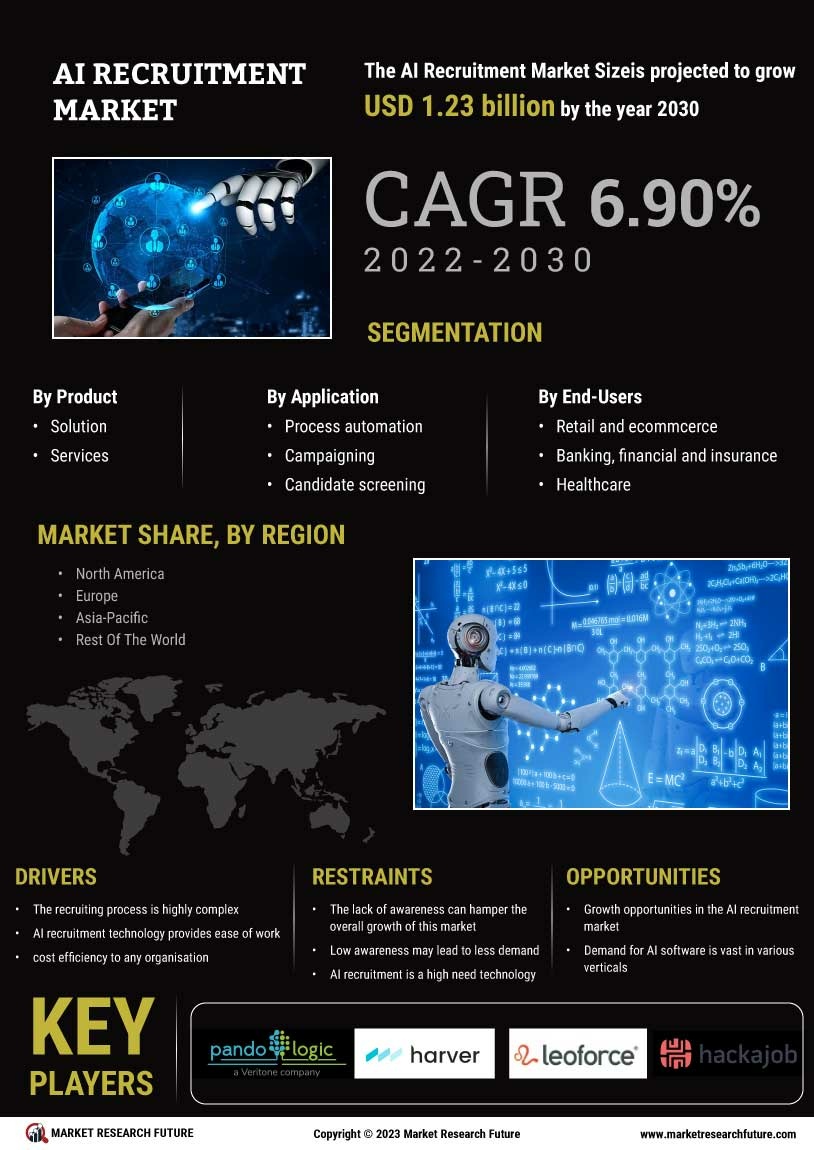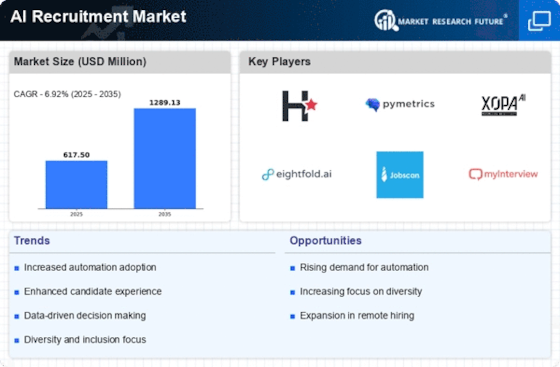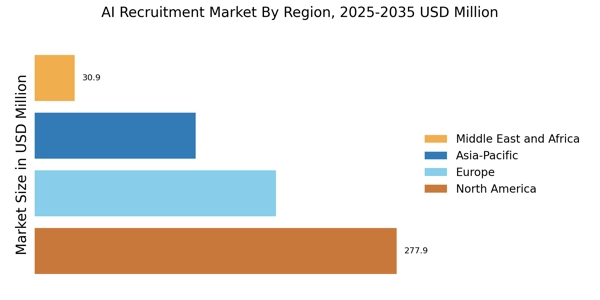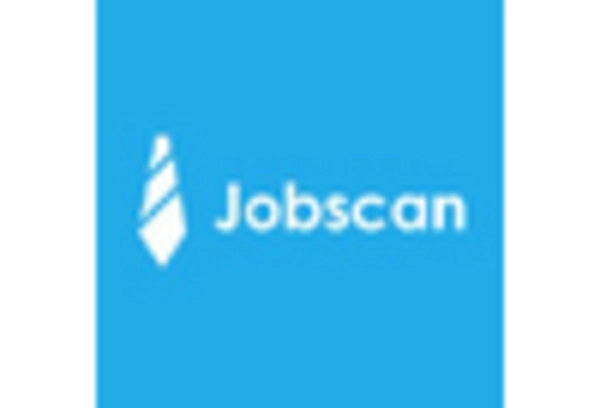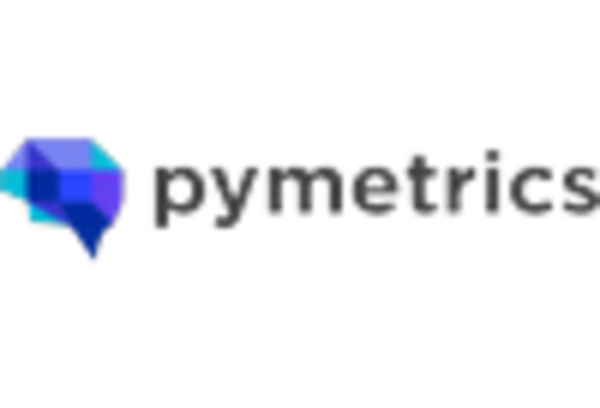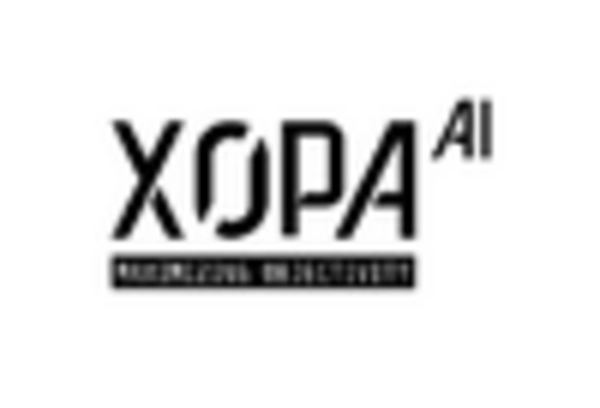Advancements in AI Technology
The AI Recruitment Market is significantly influenced by advancements in artificial intelligence technology. Innovations in machine learning, natural language processing, and predictive analytics are transforming how organizations approach recruitment. These technologies enable more accurate candidate assessments and improve the overall efficiency of the hiring process. For instance, AI algorithms can analyze vast amounts of data to identify the best candidates based on specific criteria, thereby enhancing the quality of hires. The integration of AI tools into recruitment processes is expected to increase, with a projected market growth of 10.2% annually. This technological evolution not only streamlines recruitment but also provides organizations with a competitive edge in attracting and retaining talent.
Focus on Diversity and Inclusion
The AI Recruitment Market is increasingly shaped by a focus on diversity and inclusion within organizations. Companies are recognizing the importance of building diverse teams to foster innovation and improve performance. AI recruitment tools are being leveraged to mitigate unconscious bias in hiring processes, ensuring a fair evaluation of candidates from various backgrounds. Data suggests that organizations with diverse workforces are 35% more likely to outperform their competitors. As a result, the demand for AI solutions that promote diversity in recruitment is on the rise. This trend is likely to continue, as businesses strive to create inclusive environments that reflect the diverse customer base they serve, thereby driving growth in the AI Recruitment Market.
Increased Demand for Talent Acquisition
The AI Recruitment Market experiences a notable surge in demand for talent acquisition solutions. Organizations are increasingly recognizing the need for efficient recruitment processes to secure top talent. According to recent data, the recruitment technology market is projected to grow at a compound annual growth rate of 8.5%, indicating a robust appetite for innovative hiring solutions. This trend is driven by the competitive landscape where companies strive to attract skilled professionals quickly. AI-driven recruitment tools streamline the hiring process, reduce time-to-hire, and enhance candidate matching, thereby addressing the pressing need for effective talent acquisition strategies. As businesses continue to expand, the reliance on AI recruitment technologies is likely to intensify, further propelling the growth of the AI Recruitment Market.
Regulatory Compliance and Data Security
The AI Recruitment Market is increasingly influenced by the need for regulatory compliance and data security. As organizations adopt AI technologies for recruitment, they must navigate complex legal frameworks governing data protection and privacy. Compliance with regulations such as the General Data Protection Regulation (GDPR) is paramount, as failure to adhere can result in substantial penalties. Consequently, AI recruitment solutions that prioritize data security and compliance are gaining traction. Companies are seeking technologies that not only enhance recruitment efficiency but also ensure the protection of candidate data. This focus on regulatory compliance is likely to drive innovation within the AI Recruitment Market, as providers develop solutions that align with legal requirements while delivering effective recruitment outcomes.
Cost Efficiency in Recruitment Processes
The AI Recruitment Market is witnessing a shift towards cost efficiency in recruitment processes. Organizations are increasingly adopting AI-driven solutions to reduce hiring costs and optimize resource allocation. By automating repetitive tasks such as resume screening and initial candidate assessments, companies can significantly lower operational expenses. Research indicates that organizations utilizing AI in recruitment can save up to 30% on hiring costs. This financial incentive is compelling businesses to invest in AI recruitment technologies, as they seek to maximize their return on investment. The trend towards cost-effective recruitment solutions is expected to bolster the growth of the AI Recruitment Market, as more companies recognize the financial benefits of integrating AI into their hiring strategies.
